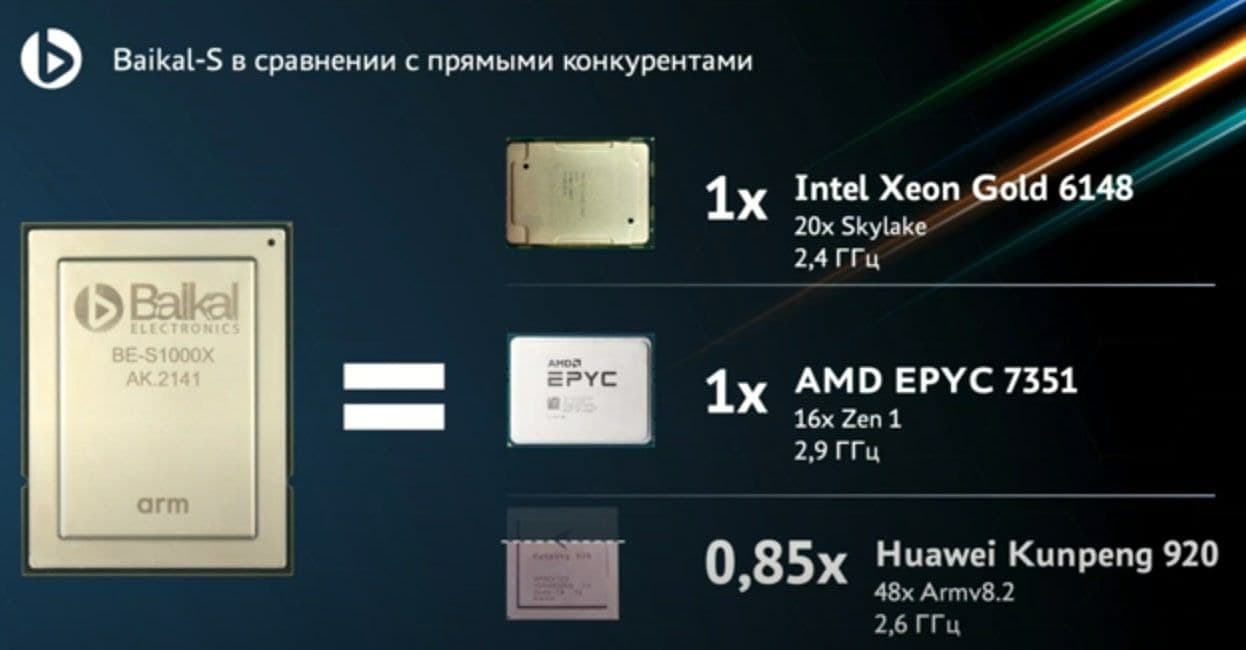Baikal Electronics, the developer of the Russian server processor Baikal-S, recently conducted performance testing of its flagship chip and compared its capabilities with competing central processing units (CPUs) from Intel and Huawei. The Baikal-S, featuring 48 ARM Cortex-A75 cores, was pitted against Intel's Xeon Gold 6230 and Huawei's Kunpeng 920. The tests encompassed various metrics to gauge performance in different areas.

Baikal-S, released in October 2021, is manufactured using 16 nm process technology, featuring six DDR4 3200 MHz memory channels with up to 768 GB per socket and supporting hardware virtualization. Encouragingly, Baikal-S also includes three CCIX x16 interfaces, enhancing its interconnect, as well as a set of I/O interfaces including 80 PCIe Gen 4.0 lanes. Notably, Baikal-S underwent testing at both 2 GHz and 2.5 GHz clock frequencies, with the latter demonstrating superior performance, achieved through significant engineering refinements.
The CoreMark benchmark demonstrated that while Huawei's Kunpeng 920 outperformed Baikal-S by 22.9% in multi-core mode, Intel's Xeon Gold 6230 exhibited even more superior performance. However, the Baikal-S developers emphasized that CoreMark is not all-encompassing and may not fully represent various aspects of processor performance.
In the Stream benchmark, which measures memory performance, Baikal-S showcased noteworthy improvements in single-threaded mode, indicating its potential for enhanced efficiency. The Linpack benchmark revealed a substantial increase in performance with a 25% frequency boost, with Baikal-S closing the gap on Kunpeng 920 and outperforming it in specific instances.
Baikal-S developers also scrutinized the 7z benchmark, which assesses file compression and decompression speeds. The results indicated that at 2.5 GHz, Baikal-S exhibited impressive improvements in both single-threaded and multi-threaded operations, although it fell short against Kunpeng 920. However, the Xeon Gold 6230 lagged behind in uncompressed performance.
Moreover, when evaluating performance in solving applied problems using the Geekbench 5 benchmark, Baikal-S displayed commendable results, particularly in real-world application-based tests, positioning it as a strong contender against competitors.
Looking ahead, Baikal Electronics is committed to advancing its processor lineup, with a new generation Arm v9 Baikal-S2 chip slated for release in mid- 2025. The Baikal-S2 is expected to deliver a significant performance leap, leveraging 6 nm technology and supporting up to eight DDR5 memory channels, showcasing the company's ambition to continually push the boundaries of processor capabilities.
While the Baikal-S may not currently lead the price-to-quality ratio, it presents an enticing option for Russian customers seeking to upgrade their server fleet and storage systems, especially in the face of current sanctions. With ambitious development plans and substantial government support, Baikal Electronics is poised to elevate its standing in the global processor market.







